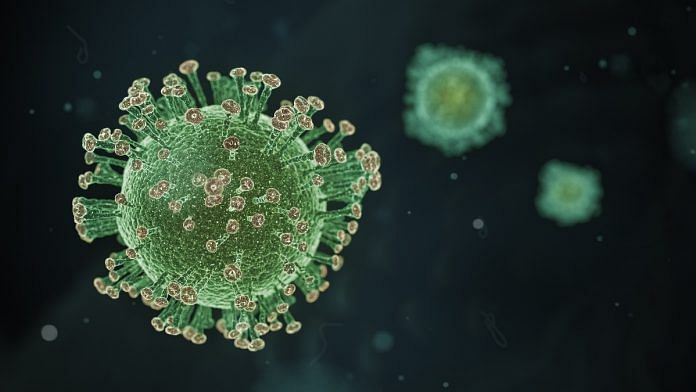New Delhi: The Covid-19 variant known as B.1.617, first identified in India, may evade antibodies induced by the Pfizer mRNA and Covishield vaccines, preliminary research shared by the Indian SARS-CoV-2 Genomic Consortia (INSACOG) shows.
The researchers, however, add that while the B.1.617 does enough to cause breakthrough infections (infections in fully vaccinated people), it does not lead to severe or life-threatening versions of the disease.
The World Health Organization (WHO) had Tuesday classified B.1.617 as a variant of concern at the global level.
In the study that is yet to be peer-reviewed, researchers from the INSACOG, along with the Covid-19 Genomics UK (COG-UK) Consortium, studied the effect of blood samples from vaccinated individuals against a pseudotyped virus system with HIV-1 particles that enveloped the SARS-CoV-2 spike.
Pseudotyped viruses are viral particles formed with a structural and enzymatic core of one virus and the envelope of another. These particles are unable to replicate, and therefore allow scientists to study dangerous viruses in a lower-risk setting.
The team found that the mutation P681R, found in all the sublineages of B.1.617, increases the formation syncytium (multiple nuclei). Previous research has shown that the spike protein of SARS-CoV-2 induces syncytia.
A cell normally contains only one nucleus, which acts as its information centre. Viral proteins sometimes cause an infected cell to fuse with neighbouring cells, leading to the formation of enlarged cells with more that one nuclei. These multi-nucleated cells are called syncytia.
In simpler terms, B.1.617.1 — one of at least three sub lineages of the variant found in India (the other two being B.1.617.2 and B.1.617.3) — potentially contributes to faster spread of Covid-19 and quicker infection growth rates.
Anurag Agrawal, one of the authors of the study, however, told ThePrint that clinical data still needs to be looked at to determine what the increased syncytia formation means for the disease in real world settings.
“For now the data supports at least one molecular mechanism of increased syncytia formation,” said Agrawal, who heads the CSIR Institute of Genomics and Integrative Biology (CSIR-IGIB).
‘Healthcare workers got infected despite vaccine’
The researchers also found at least 33 healthcare workers in a Delhi hospital (not named) who got infected with Covid-19 despite being fully vaccinated with the Covishield vaccine.
Most of these breakthrough infections were dominated by B.1.617.1, although the research notes that this may be because this was the most prevalent variant at the time of the study (during March and April).
But importantly, none of these infections turned severe.
Agrawal said this could be because while B.1.617 does cause breakthrough infections, vaccines do not completely lose their efficacy against it.
He added that he believes these findings can be generalised to Covaxin as well, although the data for Covaxin is lacking since only a small proportion of people have received this vaccine.
“In my opinion, enough number of breakthrough infections have taken place at AIIMS Delhi and LNJP (Lok Nayak Jai Prakash Narayan Hospital), both of which primarily used Covaxin,” he said. “However, even these have not seen a huge number of severe cases among those infected after vaccination.”
(Edited by Arun Prashanth)
Also read: ‘Double mutant, triple mutant, Bengal lineage’ — Covid variants driving India surge decoded



